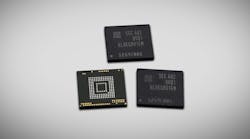Samsung, amid a slowdown in the global smartphone market, said that it had started manufacturing a 1TB storage chip for mobile devices. The chip doubles the storage of the company’s current highest capacity chips without increasing the package size. Samsung said that the chip will give smartphones storage levels comparable to some personal computers, allowing them to hold more photographs, videos and apps than ever.
The company previously produced chips that could store 512GB, while allowing customers to add more storage to its flagship smartphones using a separate 512GB card, which costs an additional $350. Samsung’s semiconductor unit, which brings in most of the South Korean conglomerate’s profits, said that it plans to increase production of the NAND chip in the first half of this year. The company declined to disclose when the latest chips could be used in smartphones.
The chip will "play a critical role in bringing a more notebook-like user experience to the next generation of mobile devices," Cheol Choi, head of Samsung's memory sales and marketing, said in a statement. He added that the company "is committed to assuring the most reliable supply chain and adequate production quantities to support the timely launches of upcoming flagship smartphones in accelerating growth of the global mobile market.”
The chip is also significantly faster than parts currently inside smartphones. It can support read speeds of a gigabyte per second, or double a typical SATA storage device. That means high definition videos can be offloaded to an external storage device in around five seconds, around 10 times quicker than a typical microSD card, according to Samsung. Faster random read and write speeds also allow smartphones to shoot higher quality video, the company said.
Samsung and other phone manufacturers are facing a global smartphone industry slowdown as market reaches maturity. Sales of smartphones in the third quarter reached 389 million units, an increase of around 1.4 percent from the second quarter, market researcher Gartner reported in December. Without strong growth in lower cost models from Huawei and Xiaomi, sales would have declined by 5.2 percent, said Gartner research director Anshul Gupta.

